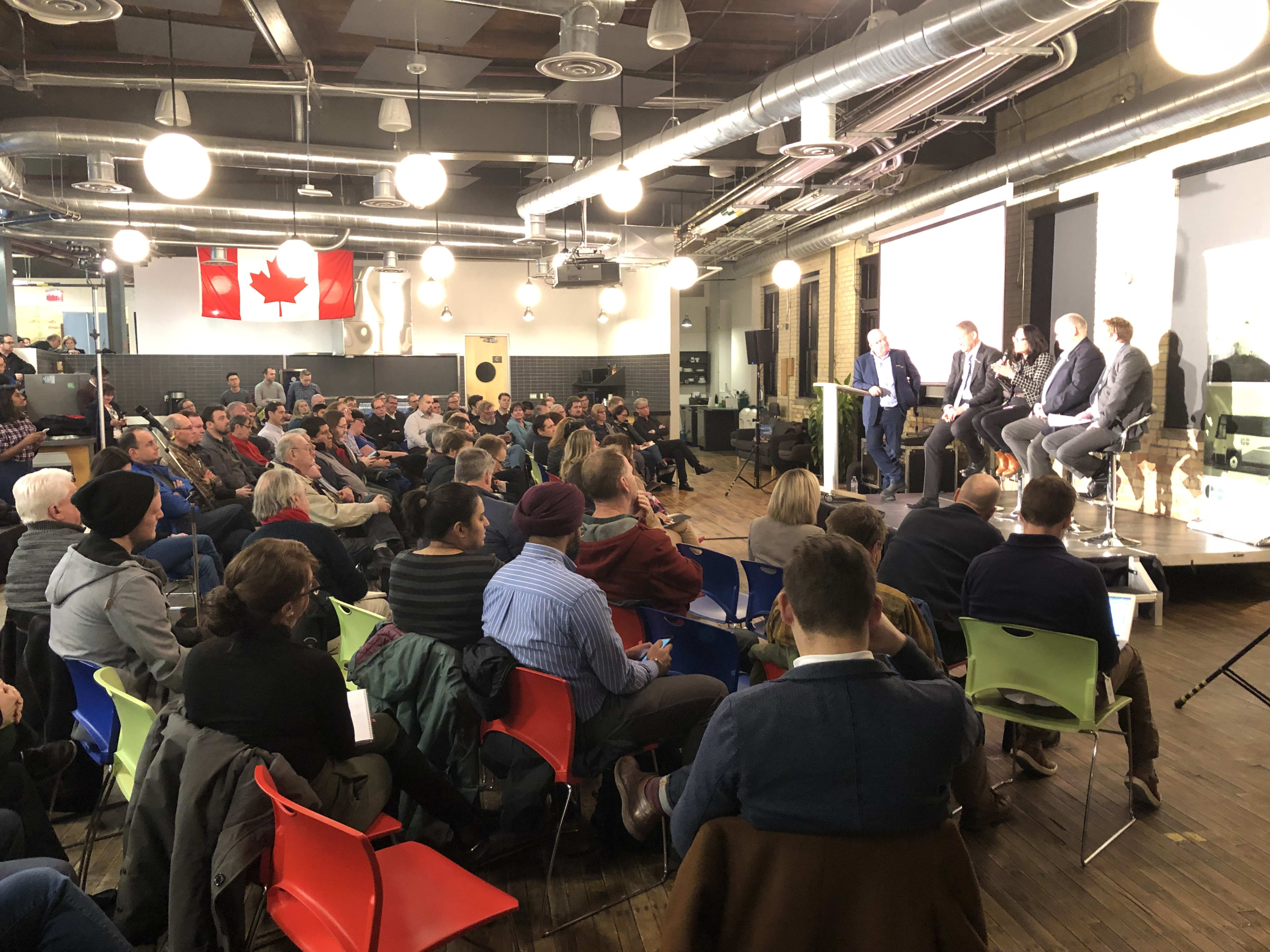Kitchener packs town hall for public meeting
Community members from across Waterloo question Metrolinx execs on transit in their region.
Mar 5, 2019
It was the one question put to Metrolinx CEO Phil Verster that made the packed room bustle.
Standing at the microphone, the man asking was firm.
Why, he wondered, couldn’t those GO train seats be softer and more comfortable? The answer, in part, Verster explained to him, has to do with the need to be designed of fire retardant material.
As more than 150 people packed a Communitech meeting space in downtown Kitchener, Ont., on March 4, for the sixth Ask Metrolinx town hall – the first outside Toronto, where customers and community members were able to quiz Metrolinx’s top executives about ongoing improvements to GO Transit – the questions were topically and geographically all over the map.
There was one on allowing independent developers access to real-time GO bus schedules across the Greater Golden Horseshoe. An idea that could potentially have a future on a smartphone near you.
And someone else wanted to know about electrification across Metrolinx’s transit corridors. Verster’s answer, beyond that it is seriously being explored, came with a lesson on how the dynamic motors of some electric trains can recharge their own batteries even as they quickly brake to a stop at platforms.
But the night was largely dominated by conversations around upgrades to service in Kitchener and points beyond.
The ‘beyond’ part was just where Ron Bowman was headed with his question. The former rail man – he retired after spending 37 years with Canadian Pacific Railway – wanted to know about improvements to transit for the city of Cambridge, located south of Kitchener.
Bowman asked Verster about future GO plans for his community.
The question led to a wider discussion on how, and where, Metrolinx is making immediate steps on better service, as well as the business philosophy guiding further plans.
Verster pointed out the advances – and quickening of pace – that have taken place for GO Transit customers in the region this year. While past plans called for a timeline of 2025 for increased service to Kitchener, the CEO said thanks to negotiations with CN, which owns area corridor rail lines, Metrolinx managed to start offering local residents more train options in January.
While Metrolinx had previously looked at building an expensive and time-consuming local freight-bypass, there is a new vision and solutions that are bringing improved service now rather than someday.
“In January we had a first step increase,” Verster told the audience, including scores of people watching online.
There are more steps to come.
“We don’t have to wait until 2025,” he said
Of Cambridge, he explained to Bowman and the audience, studies and cost analysis are taking place on that service and others, but added: “We have a very strict business case approach, where if there’s going to be demand, what’s the demand, what’s the cost, what’s the longer term demand?
“One of the things that is crucial for transit planning is that our business case methodology must be really solid.”
One by one, the questions came in through those at the microphone and those online – including future of service to Guelph, more weekend offerings into Toronto and the airport, and even a conversation of which web browser works best when looking up GO schedules.
But of the central theme of continued improvements, Verster said: “Here’s the positive thing…everyone in Kitchener wants services quicker.
“Eighteen months ago I made it one of my three highest objectives to get Kitchener services sooner.”
Metrolinx chief operating officer Greg Percy said it’s not just about more service, but quicker trips.
“Today, it’s two hours and five minutes – that’s unacceptable,” he said of a journey to Kitchener from Toronto.
Trimming that time down is a priority, with Percy explaining his biggest obstacles are 33 level crossings between Kitchener and Georgetown that slow the trains down.
“They’re legacy crossings that have been there since Ontario was created,” he told the crowd, noting Metrolinx needs to work with municipalities to close ones that are no longer relevant.
“My team knows my target is to get from 120 minutes down to 90 minutes, as quickly as possible and as quickly as the investment will allow.”
Following the meeting, Bowman said he was happy to be able to petition Metrolinx on behalf of his local, fellow customers – though he would have liked to hear of more immediate plans for Cambridge.
But rather than come out of retirement, the former railway man said he was happy to let Metrolinx leaders move the changes along, as he enjoys his position as a train passenger.
